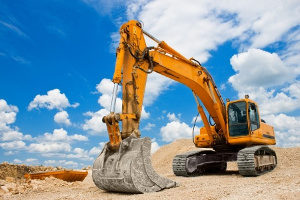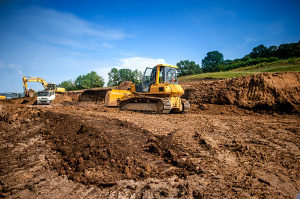As a homeowner, having knowledge about construction equipment can be invaluable when you’re undertaking a project on your property. Whether you’re grading your yard with fill dirt, having professionals unload topsoil for a garden, or carrying out renovations, understanding the machinery involved can help you supervise the project more effectively and communicate better with construction workers.
This guide will delve into three main categories of construction equipment: earth-moving equipment, construction vehicles, and material-handling equipment.
Earth Moving Equipment
Earth-moving equipment is designed to manipulate large quantities of soil, rock, and other materials. These machines are crucial for landscaping, foundation work, and major construction projects. Let’s explore some common types:
Excavators
 Excavators are versatile machines characterized by their long arm (boom) and bucket. They’re used for:
Excavators are versatile machines characterized by their long arm (boom) and bucket. They’re used for:
- Digging foundations, trenches, and holes
- Lifting and moving heavy materials
- Demolition work
- River dredging
Excavators come in various sizes, from mini-excavators suitable for small residential projects to large models used in major construction sites.
Graders
Graders, resembling tractors with a long blade attachment, are primarily used for:
- Creating flat surfaces
- Shaping roads and driveways
Preparing surfaces for paving - Creating proper drainage slopes
Loaders
Loaders, including front-end loaders and backhoe loaders, are designed for:
- Moving materials like dirt, gravel, or snow
- Loading trucks with materials
- Clearing rubble
- Digging (in the case of backhoe loaders)
Bulldozers
Recognizable by their wide, flat blade at the front, bulldozers are used for:
- Pushing large quantities of soil or rubble
- Rough grading
- Clearing land of vegetation
- Demolition work
Trenchers
Specialized for digging narrow trenches, these machines are crucial for:
- Laying pipes or cables
- Creating drainage systems
- Installing irrigation systems
Scrapers
Ideal for large, open areas, scrapers are used for:
- Quickly moving large volumes of earth
- Leveling surfaces
- Cut and fill operations in road construction
Construction Vehicles
Construction vehicles are primarily used for transporting materials to, from, and around construction sites. These vehicles play a crucial role in the efficiency of any construction project.
Tippers (Dump Trucks)
 Tippers are trucks with a hydraulically operated open-box bed hinged at the rear. They’re used for:
Tippers are trucks with a hydraulically operated open-box bed hinged at the rear. They’re used for:
- Transporting loose materials like sand, gravel, or demolition waste
- Unloading materials quickly by tilting the bed
Dumpers
Similar to tippers but typically smaller and with the dump body extending over the cab, dumpers are ideal for:
- Maneuvering in tight spaces
- Transporting materials over rough terrain on construction sites
Trailers
Trailers are unpowered vehicles towed by trucks or other powered vehicles. They’re versatile and used for:
- Transporting heavy equipment
- Moving large volumes of materials
- Serving as mobile offices or storage units on construction sites
Tankers
While less common in residential projects, tankers are crucial for transporting liquids. They might be used in construction for:
- Delivering water to remote sites
- Transporting liquid concrete
- Bringing fuel to power on-site equipment
Material Handling Equipment
Material handling equipment is designed to move, protect, store, and control materials and products throughout the manufacturing, distribution, consumption, and disposal processes.
Cranes
Cranes are essential for lifting and moving heavy loads vertically and horizontally. Types include:
- Tower cranes for tall buildings
- Mobile cranes for versatility
- Overhead cranes for factories and warehouses
In residential construction, smaller mobile cranes might be used for:
- Lifting roof trusses
- Moving heavy materials to upper floors
- Installing large appliances or fixtures
Conveyors
Conveyor systems are used to transport materials continuously. In construction, they’re useful for:
- Moving soil or aggregate materials
- Transporting materials up inclines
- Efficient loading and unloading of trucks
Hoists
Hoists are used for vertical lifting of materials. They can be:
- Electric hoists for heavy loads
- Manual chain hoists for lighter loads or areas without power
In residential construction, hoists might be used for:
- Lifting materials to roofs or upper floors
- Moving heavy equipment or appliances
Forklifts
Forklifts are essential for moving palletized materials. They’re used for:
- Unloading delivery trucks
- Moving heavy materials around the construction site
- Stacking materials in storage areas
Understanding the Equipment on Your Project
 When you’re having work done on your property, you might encounter various combinations of this equipment depending on the scale and nature of your project. For instance:
When you’re having work done on your property, you might encounter various combinations of this equipment depending on the scale and nature of your project. For instance:
- A yard grading project might involve a small excavator or bulldozer to move soil, a grader to create the proper slope, and a dump truck to bring in or remove soil as needed.
- A major home renovation could require a crane to lift materials to upper floors, conveyors to move smaller materials efficiently, and various construction vehicles to bring in supplies and remove waste.
- Installing a new septic system might involve an excavator digging the tank hole, a trencher creating lines for the leach field, and a tanker delivering the septic tank.
Schedule Your Construction Equipment Rental Today
By understanding the roles of different equipment, you can better anticipate the stages of your project and communicate more effectively with your contractors. Remember, while this knowledge is valuable, always defer to the expertise of licensed professionals when it comes to operating this equipment and managing construction projects. Safety should always be the top priority on any construction site, no matter the scale of the project.
Our team of licensed professionals not only provides expert advice but also offers a wide range of construction equipment rentals to suit your project needs. From earth-moving equipment to material-handling tools, we have you covered. We prioritize safety and efficiency, ensuring that you get the right equipment for the job and the guidance to use it properly.
Don’t let equipment concerns hold back your construction dreams. Contact Dirt Connections today to discuss your project requirements, get expert recommendations, and schedule your construction equipment rental. Let’s work together to bring your vision to life safely and efficiently!








































